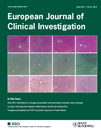IL28B and interferon-gamma inducible protein 10 for prediction of rapid virologic response and sustained virologic response in HIV-HCV-coinfected patients
Abstract
Eur J Clin Invest 2012; 42 (6): 599–606
Background A polymorphism near the IL28B gene has been shown to be associated with virologic response to antiviral treatment in HCV-infected patients. The predictive value of interferon-gamma inducible protein 10 (IP10) on treatment outcome has been described in HCV patients. Data on combining these predictors in HIV-HCV-coinfected patients are not available.
Methods Virologic parameters, IL28B single nucleotide polymorphisms (SNP) and pretreatment serum IP10 were determined in HIV-HCV-coinfected patients having completed antiviral therapy with pegylated interferon/ribavirin.
Results A total of 72 HIV-HCV-coinfected patients were included in the study; 68% had HCV genotype (GT)-1/4 and 32% had HCV GT-2/3 infections. Rapid virologic response (63% vs. 28%; P = 0·023) and sustained virologic response (SVR: 81% vs. 51%; P = 0·008) rates were significantly higher in C/C vs. non-C/C patients. Patients with low pretreatment IP10 levels (< 400 pg/mL) achieved significantly higher SVR rates than patients with high (> 400 pg/mL) IP10 levels (78% vs. 13%; P < 0·0001). C/C SNP and low IP10 levels were associated with higher SVR rates in both patients with GT-1/4 and GT-2/3. The C/C patients with low IP10 achieved SVR rates of 97% compared with SVR rates of 9% in non-C/C patients with high IP10.
Conclusion The IL28B SNP influences rapid viral response, relapse rates and SVR. The combination of IL28B and IP10 represents a predictive model of SVR in HIV-HCV coinfection.




